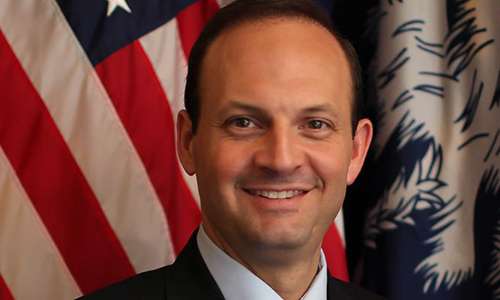RAWA Hearing Follow-Up: South Carolina AG Alan Wilson’s False and Misleading Rhetoric
Among the comical highlights from this past Wednesday’s comical hearing attempting to drum up support for the Sheldon Adelson-sponsored RAWA (“Restoration of America’s Wire Act”) measure was the written and oral testimony of South Carolina Attorney General Alan Wilson. Wilson, a rabid foe of gambling in any form, also has a long track record of radical-right positions on a wide variety of social and ethical issues.
 It’s no surprise that Wilson’s against gambling, in accordance with his assumed role in performing his South Carolina AG duties according to his personal religious beliefs. What was disappointing (if sadly expected) in Wilson’s ongoing performance and testimony regarding RAWA is his willingness to lie and twist and omit elements from the factual record in order to promote his desired social agenda.
It’s no surprise that Wilson’s against gambling, in accordance with his assumed role in performing his South Carolina AG duties according to his personal religious beliefs. What was disappointing (if sadly expected) in Wilson’s ongoing performance and testimony regarding RAWA is his willingness to lie and twist and omit elements from the factual record in order to promote his desired social agenda.
As part of his appearance before the House Oversight Committee on Wednesday, Wilson also submitted an 11-page statement for the committee’s consideration. Wilson excerpted from this statement in making his opening remarks. We’ll do some excepting here as well, but this time with an eye toward fact-checking and accuracy. It’s quite the trip.
First, Wilson is among those who is quite willing to twist the concept of “states’ rights” regarding gambling and other social issues to fit his own personal and political agenda. Wilson even allows that the 10th Amendment to the US Constitution largely cedes responsibility for gambling matters to the states, which is the opposite of what the RAWA bill he supports actually intends to do. Here are some Wilson statements, as he performs a logically false 180-degree turn to support his incongruous RAWA position.
Sayeth Wilson:
The members of this Committee should recognize that under our Constitution, particularly the Tenth Amendment, the states have virtually exclusive authority over gambling. As the Fourth Circuit has recognized, gambling regulation is an “area where states have much expertise and competence, and it lies at the core of a state’s police power.” [case citation] Each state is entitled to decide for itself how or whether to regulate gambling or to ban it altogether.
Later:
That is the way our Founding Fathers intended the Constitution to work: the Federal Government should respect the rights of states, not destroy those rights.
And now, thus, to twist:
But the [2011 USAG Eric Holder] DOJ Opinion strikes at the very heart of state powers. DOJ lawyers cannot rewrite what Senators and Congressmen have enacted. The Executive Branch cannot supersede the Legislative. The original Wire Act, with its respect for states rights and prerogatives should thus be restored so that casino gambling does not operate over the Internet in the states which have outlawed it in their communities.
Except that it’s 100% false, adding up a whole string of smaller falsehoods to create one monstrous lie. Let us note the ways:
- Eric Holder as US Attorney General was part of the Judiciary branch of government, not the Legislative one. (The entire office was created by the Judiciary Act of 1879.) Holder was nominated by US President Barack Obama but subsequently approved as AG by the US’s federal Legislative branch. Wilson’s statement is a political lie designed to perpetuate the right-wing mantra, true or false in various matters, that “It’s Obama’s fault.”
- Holder, as part of the Judiciary, was exactly responsible for determining the meaning of all US laws on the books, new and old, including the 1961 Wire Act. This was part of his job, and it’s what the Judiciary does. The final word would come if a case based on Holder’s interpretation comes to trial in a major US court case.
- The Holder opinion remains an opinion only until confirmed or overwritten by case law. It has no more or no less impact in that respect than the original DOJ opinion regarding the reach of Wire Act, which was also done by — you guessed it — another USAG opinion. Arguing that only the opinions one favors are legally or politically value is actually shameful behavior for a sitting state-level attorney general.
- The Wire Act in its original 1961 form has no more or no less “respect” for states’ rights and prerogatives than Holder’s 2011 opinion or any subsequent opinion that comes along. If anything is utterly disrespectful to states’ rights, it’s the Adelson-funded RAWA bill.
It’s hard to get by that paragraph’s singular mountain of malarkey, but try we shall. Here’s some classic Wilson, blaming the federal government for his own state’s resumed failure to enforce his own laws, as Wilson sees it:
In South Carolina, gambling is largely prohibited and has been throughout the history of our state. Our state even has laws which allow those who sustain gambling losses to sue to recover those losses. South Carolina courts recognize that the public policy of the state is to prohibit gambling. In recent years, my office, our State Law Enforcement Division, and various local law enforcement agencies have had to combat a short-term proliferation of internet sweepstakes cafes which displayed internet-based casino-like games on computer terminals in strip mall outlets, some of which even lured patrons with promises of free cell phones provided by the federal government. …
South Carolina, is, as most readers know, a strident anti-gambling state, probably #2 on that scale to Mormon-dominated Utah, home of RAWA bill sponsor Jason Chaffetz. South Carolina has no internet-specific anti-gambling statutes, but its generalized gambling laws are so all-encompassing that any sensible read of the statutes leads one to the interpretation that online gambling is illegal in the state, whether as a player or as a service provider.
But here’s the thing: All of the services being accessed illicitly by South Carolinans are housed on unregulated offshore sites, upon which RAWA would have zero effect. None of the regulated, US-based online gambling sites offer their services to South Carolina residents.
This is actually one of the biggest lies of RAWA and Adelson. The evil Las Vegas Sands CEO is, via RAWA, trying to cripple his marketing competition by conflating legal and regulated online gambling with the offshore, unregulated variety. Folks such Wilson and Chaffetz are too stupid (somewhat less likely) or too prejudiced (significantly more likely) to be able to honestly and subjectively parse this important difference.
Time for some Wilson hyperbole:
Furthermore, South Carolina’s experience with video poker was traumatic. Video poker became a $2 Billion dollar industry in the state and carried with it such an addiction problem that mothers left children to die in cars while they played video poker. …
There was one very sad case with a South Carolina connection, but only one; “mothers left children to die in cars” is a “family”-pandering exaggeration on several counts. Back in 2003, according to several sources, “A Georgia mother pleaded guilty to involuntary manslaughter after her 10-day-old baby died of dehydration in a sweltering parked car – while she played video poker for two hours at a South Carolina mini-casino.”
The actual mini-casino was not internet-based, though that’s not to say a similar game or circumstance with online connections couldn’t occur. Yet this is instead an example of a severe problem-gambling episode, with admittedly tragic consequences. Wilson’s inclusion of it here is not a RAWA argument, but a generalized anti-gambling one. Realize that if this mother was willing to drive from another state to play video poker in a South Carolina strip mall, she had a larger problem, and it’s also arguable that her gambling addiction would have led to severe consequences at another place, another time.
Gambling addiction does cause problems (and on occasion, very tragic ones), but working to alleviate problem behaviors is far superior than attempting to inflict one’s religious beliefs on others through the creation of a faith-based Harrison Bergeron society.
What sadness, in so many forms. And what utter bunk, if viewed clinically. Here’s some more prime-time Alan Wilson:
Despite South Carolina’s continued best efforts over the decades to protect our citizens from the threats posed by gambling, the Department of Justice’s (DOJ) revised interpretation of the Wire Act has opened the door to Internet gambling, potentially turning any mobile device in our state into a virtual casino. The 2011 DOJ opinion creates another loophole for those looking to circumvent South Carolina state law. It allows entities, many of which are foreign-national corporations, to operate online casinos in states like Nevada, Delaware, and New Jersey without any assurance that these online casinos are not being accessed in states like South Carolina. What South Carolina’s legislature has specifically shut down, DOJ has reopened in another form with a single stroke of the pen of an unelected bureaucrat.
And:
This unilateral opinion has opened a Pandora’s box of enforcement issues for states like South Carolina. Overnight, a DOJ attorney transformed casino gambling from a tightly controlled activity requiring interstate or international travel for South Carolinians to an app on a smart phone available 24/7 with the tap of a finger.
Oh, horseburgers.
The only sites that are keeping South Carolina residents from participating are those based in regulated jurisdictions. Whether that’s sites in the three regulated US states (New Jersey, Nevada and Delaware), or major Euro-based firms bound by EC codes and US trade agreements, RAWA literally can’t stop them from doing what they already do voluntarily, blocking services to would-be South Carolina players. It’s the unregulated sites that RAWA can’t effectively touch anyway that some South Carolina players might access or have been accessing all along.
Wilson — and Chaffetz, and of course Adelson — want to claim that RAWA protects US citizenry, and many of RAWA’s supporters are quite willing to delude themselves that it would. But RAWA strives for nothing of the sort. It would just protect Adelson’s billions by eliminating legal competition.
There are tons of assurances and empirical evidence that South Carolina residents have not played and are not able to play on the online-gambling sites in any of the three US states that currently allows them. When asked for examples, Wilson and his allies hold up empty hands, despite claiming that ” age and location verification mechanisms [are] subject to compromise.” There are no such examples, because the geo-blocking and ID-verification protocols employed by the sites work as advertised, in direct contradiction to Wilson’s false “without any assurance” claim in the above.
The general consensus is that Wednesday’s hearing represented RAWA’s last gasp, that the hearing was so horrific for Adelson’s and Chaffetz’s cause that there’s no serious chance that RAWA could even clear an orchestrated committee vote. That’s great if true, but the core problem is sure to return down the road. RAWA represented a rare welding of outsized corporate greed with religious-based idealism — a nasty bill whose slight chances existed for all the wrong reasons. RAWA might soon be abandoned, but the forces behind it remain intact. And they’re likely to try again.




















COMMENTS